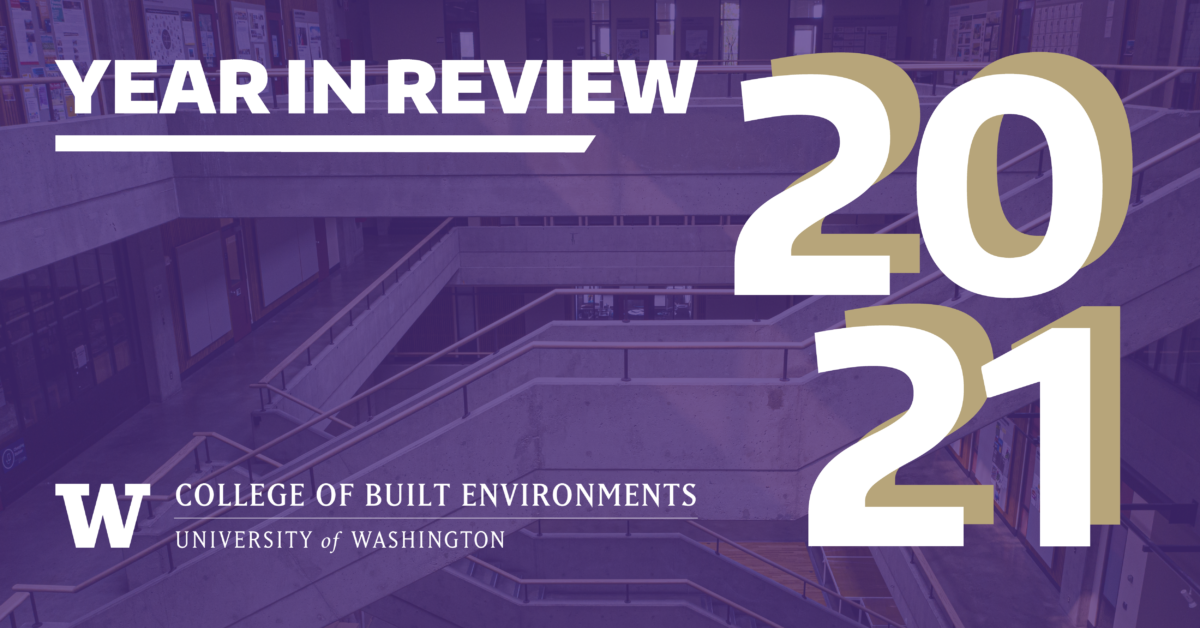Posted on January 24, 2022
Post categories: Dean

In spite of the many challenges we faced, it was a year of many accomplishments for the College of Built Environments (CBE), below are some highlights of the many events and achievements to celebrate from 2021.
CBE welcomed students back to in-person education in the Autumn with a series of tours of notable places and spaces in Seattle hosted by our professional partners. The College adopted its 5-year Strategic Framework through a highly collaborative process. We were proud to welcome Washington Governor, Jay Inslee, to the College for a discussion on climate solutions led by Carbon Leadership Forum Director and Chair of the Department of Architecture, Kate Simonen. We continued our #CBEchronicles lecture series in partnership with our faculty-led Humanities, Histories, and Futures group. We also hosted several successful events – the Runstad Real Estate Leadership Dinner, Mind’s Eye Sketchbook: Celebrating 50 years of art and observation by John Owen dedicated to the Urban Design and Planning department Endowed Equity Fund, and the Construction Management Hall of Fame. We were excited to launch the inaugural Aspire Program, connecting UW students with industry leaders to explore equity in real estate.
Members of the CBE community were featured in publications such as The Seattle Times, Fast Company, Forbes, and The New York Times.
The College and our members received numerous awards this year, highlighting a few of these accolades: John Schaufelberger, professor of Construction Management and Dean Emeritus, received the Lifetime Achievement Award from the Associated Schools of Construction; Rick Mohler, associate professor of Architecture, was elevated to the American Institute of Architects College of Fellows; Thaïsa Way, professor of Landscape Architecture, was awarded the Bradford Williams Medal in recognition of excellence in writing about landscape architecture; the Nehemiah Interdisciplinary Studio: Building Beloved Community received a Lincoln Institute of Land Policy Curriculum Innovation Award; Kate Simonen, chair of the Department of Architecture, was awarded the AIA Seattle Community Service Award. And finally, the Scan Design Foundation was awarded UW Presidential Laureate status for their generosity over the years totaling more than $10M and encompassing programs within the College of Built Environments, the College of the Environment, the College of Arts & Sciences, and UW Medicine.
We were grateful to expand the ways we support underrepresented students at the college with the creation of the Endowed Scholarship for Diversity, Equity and Inclusion in Landscape Architecture and the Urban Design and Planning Endowed Equity Fund. And we were thrilled to partner with MIG Inc. in creating the MIG Scholarship Fund For The Design of Equitable and Inclusive Environments.
Despite difficult and unprecedented challenges the last year, students persevered and we were immensely proud to award over 340 degrees across our bachelor’s, master’s, and Ph.D. programs.
It was also a productive year for CBE research. Our scholars published over fifty-five peer-reviewed research articles, books, and other research output. In 2021 we conducted over $3 million in funded research; you can learn about this work at the CBE Research Portal. We also launched the CBE Inspire Fund, which supported six projects in its inaugural year. The Fund is designed to support college research activities for which a relatively small amount of support can be transformative. And, in alignment with our Strategic Framework, CBE scholars are working in transdisciplinary “communities of practice” to explore new research frontiers in the topics of climate solutions; humanities, histories, and futures; and technology in the built environments.
Our top news stories of the year were:
In 2022, we’re excited to continue working across disciplines and sectors to realize a more just and beautiful world. As part of that work, we’re bringing in 5 new thought leaders through our faculty cohort hire; providing our students with immersive educational experiences; and developing an Equity, Diversity, and Inclusion strategic plan.